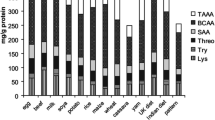Abstract
Recent Healthy Drinks, Healthy Kids (HDHK) guidelines state children between 12 and 24 months need to be consuming 2–3 cups a day of whole fat cow’s milk, and less of all other beverages except water. Guidelines explicitly state plant-based milks should be avoided (with the exception of soy milk). We agree that in the first 12 months the optimal food for childhood growth is breast milk, with formula used where needed. However, after weaning, milk of any kind is not required, and should not be relied upon as a main source of calories. Children will be fine with water and a healthy balanced diet. Whether cow’s milk should be consumed is beyond our scope here, however it is clear that plant-based milks can easily be included in day-to-day use post-weaning. Used in this fashion plant-based milks can be less harmful than dairy milks; at least for certain groups. Although cow’s milk is rich in calcium, it does not appear to clearly reduce fractures, but consumption carries risks including: a potential association with type 1 diabetes mellitus onset; anemia in toddlers; lactose intolerance; cow’s milk protein allergy; and infantile colic. Adverse effects from normal consumption must be compared against risks from plant-based milks, which are problematic mainly when used inappropriately in otherwise unbalanced diets; e.g. with inadequate solid foods. Despite limited evidence of serious harms from consumption of plant-based milks, HDHK provides vigorous recommendations, especially by comparison to guidelines with more evidence to support their stance (such as processed meats causing colorectal cancer).

Similar content being viewed by others
References
Academy of Nutrition and Dietetics (AND), the American Academy of Pediatric Dentistry (AAPD), the American Academy of Pediatrics (AAP), and the American Heart Association (AHA). (2019). Healthy beverage consumption in early childhood. recommendations from key national health and nutrition organizations. Retrieved September 28, 2019, from https://healthydrinkshealthykids.org/.
Bellatti, A. (2019). The academy of nutrition and dietetics, corporate sponsorship and the alternative: Dietitians for professional integrity. British Journal of Sports Medicine, 53(16), 986–986. https://doi.org/10.1136/bjsports-2017-098642.
Bradbury, K. E., Murphy, N., & Key, T. J. (2019). Diet and colorectal cancer in UK Biobank: A prospective study. International Journal of Epidemiology. https://doi.org/10.1093/ije/dyz064.
Chia, J. S. J., McRae, J. L., Kukuljan, S., et al. (2017). A1 beta-casein milk protein and other environmental pre-disposing factors for type 1 diabetes. Nutrition & Diabetes, 7(5), e274. https://doi.org/10.1038/nutd.2017.16.
Dietary Guidelines Advisory Committee. (2015). Scientific report of the 2015 Dietary Guidelines Advisory Committee: Advisory report to the Secretary of Health and Human Services and the Secretary of Agriculture. USDA. https://health.gov/dietaryguidelines/2015-scientific-report/PDFs/Scientific-Report-of-the-2015-Dietary-Guidelines-Advisory-Committee.pdf.
Iacovou, M., Ralston, R. A., Muir, J., Walker, K. Z., & Truby, H. (2012). Dietary management of infantile colic: A systematic review. Maternal & Child Health Journal, 16(6), 1319–1331. https://doi.org/10.1007/s10995-011-0842-5.
International Agency for Research on Cancer. (n.d.). IARC monographs on the identification of carcinogenic hazards to humans. Retrieved September 28, 2019, from https://monographs.iarc.fr/agents-classified-by-the-iarc/.
Karlsen, M. C., Rogers, G., Miki, A., Lichtenstein, A. H., Folta, S. C., Economos, C. D., et al. (2019). Theoretical food and nutrient composition of whole-food plant-based and vegan diets compared to current dietary recommendations. Nutrients. https://doi.org/10.3390/nu11030625.
Lundh, A., Lexchin, J., Mintzes, B., Schroll, J. B., & Bero, L. (2017). Industry sponsorship and research outcome. The Cochrane Database of Systematic Reviews. https://doi.org/10.1002/14651858.MR000033.pub3.
Melina, V., Craig, W., & Levin, S. (2016). Position of the academy of nutrition and dietetics: Vegetarian diets. Journal of the Academy of Nutrition and Dietetics, 116(12), 1970–1980. https://doi.org/10.1016/j.jand.2016.09.025.
Rogerson, D. (2017). Vegan diets: Practical advice for athletes and exercisers. Journal of the International Society of Sports Nutrition. https://doi.org/10.1186/s12970-017-0192-9.
Ségurel, L., & Bon, C. (2017). On the evolution of lactase persistence in humans. Annual Review of Genomics and Human Genetics, 18(1), 297–319. https://doi.org/10.1146/annurev-genom-091416-035340.
Sonneville, K. R., Gordon, C. M., Kocher, M. S., Pierce, L. M., Ramappa, A., & Field, A. E. (2012). Vitamin d, calcium, and dairy intakes and stress fractures among female adolescents. Archives of Pediatrics & Adolescent Medicine, 166(7), 595–600. https://doi.org/10.1001/archpediatrics.2012.5.
U.S. Department of Health and Human Services and U.S. Department of Agriculture. 2015–2020 Dietary Guidelines for Americans. Retrieved September 29, 2019, from https://health.gov/dietaryguidelines/2015/guidelines/.
U.S. Department of Agriculture, & Agricultrure Research Service. (n.d.). FoodData Central. Retrieved September 29, 2019, from https://fdc.nal.usda.gov/.
Vitoria, I. (2017). The nutritional limitations of plant-based beverages in infancy and childhood. Nutricion Hospitalaria, 34(5), 1205–1214. https://doi.org/10.20960/nh.931.
Willett, W. C., & Ludwig, D. S. (2020). Milk and health. New England Journal of Medicine, 382(7), 644–654. https://doi.org/10.1056/NEJMra1903547.
Williams, P. V. (2013). The epidemiology of milk allergy in US children. Pediatrics, 132(Supplement 1), S17–S18. https://doi.org/10.1542/peds.2013-2294Z.
Ziegler, E. E. (2011). Consumption of cow’s milk as a cause of iron deficiency in infants and toddlers. Nutrition Reviews, 69(Suppl 1), S37–42. https://doi.org/10.1111/j.1753-4887.2011.00431.x.
Acknowledgements
NW and MS currently volunteer for the Plant Based New Zealand Health Trust registered charity, but have received funding from the same for travel costs to present at a lifestyle medicine conference in 2018. MS has previously been employed as a researcher for the same organisation. MS and NW run a free online course teaching on plant-based diets. This article was not commissioned in any way.
Author information
Authors and Affiliations
Corresponding author
Additional information
Publisher's Note
Springer Nature remains neutral with regard to jurisdictional claims in published maps and institutional affiliations.
Rights and permissions
About this article
Cite this article
Wright, N.S., Smith, M. Guidelines Suggesting Children Avoid Plant-Based Milks: A Closer Examination. Matern Child Health J 24, 1189–1192 (2020). https://doi.org/10.1007/s10995-020-02970-y
Published:
Issue Date:
DOI: https://doi.org/10.1007/s10995-020-02970-y




